
Happy to see this post getting featured in #TiEDigest – above image is from TiE Chennai Newsletter that went out on the 17 December 2019
Every year, TiE Chennai organizes their annual mega-event celebrating entrepreneurship called TiECON (2018, 2017, 2016, 2015, 2014, 2010, 2008) where we get to hear talks by industry leaders and panel discussions by experts and rising stars. This year too was no different. Below are my personal notes that I took down attending the event.
Awards Night

Chennai Children’s’ Choir – Nalanda Way
Yesterday it was the awards night which celebrated entrepreneurs from various fields. The Chennai Children’s Choir, Nalanda Way delighted the audience with their brilliant singing.
Keynote – Behold the Crystal Ball!
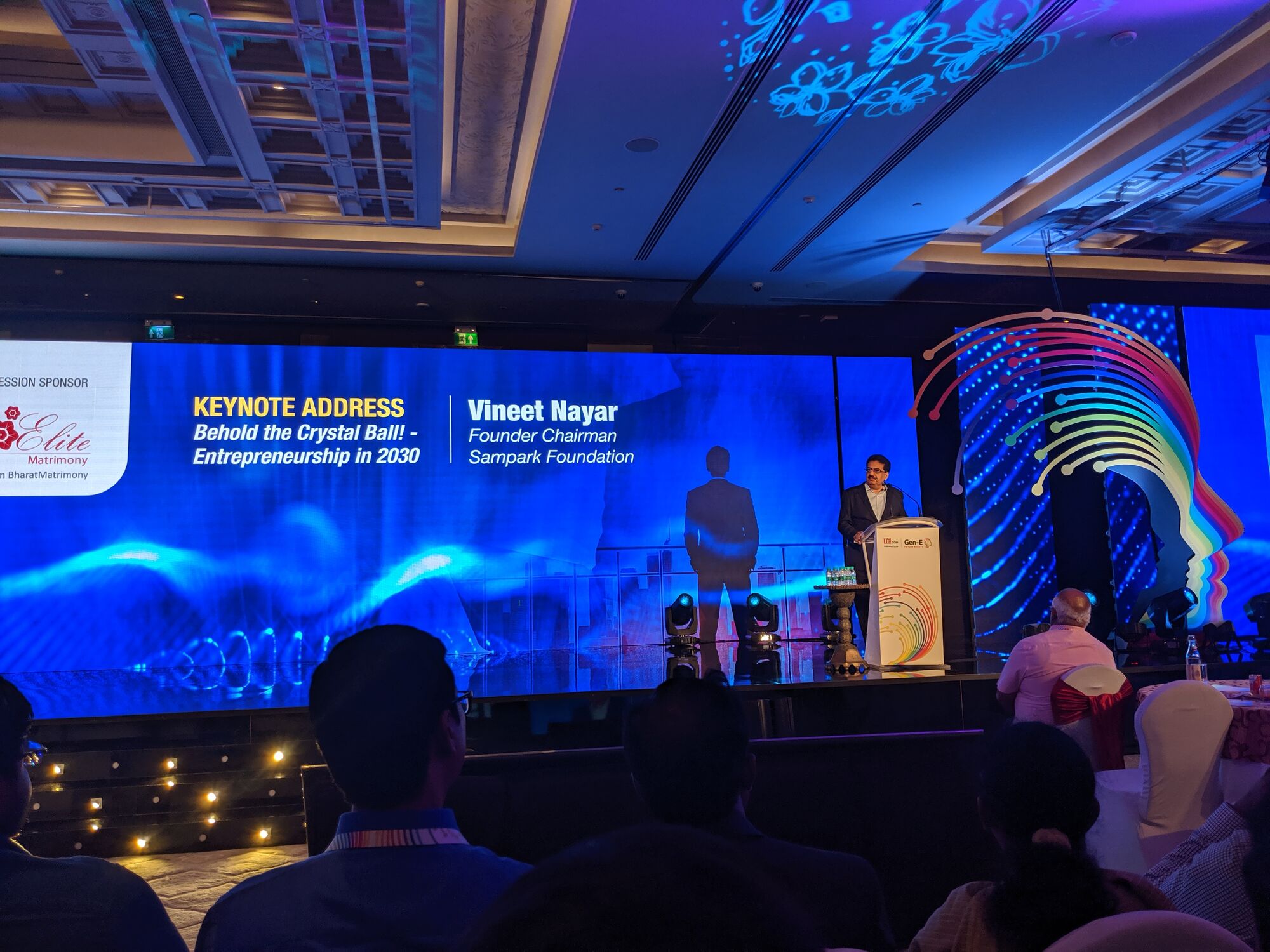
Mr Vineet Nayar, former Chief Executive Officer of HCL Technologies, Founder Chairman & CEO of Sampark Foundation
The day started with a Keynote by Mr Vineet Nayar, former CEO of HCL. He talked about “How not to be an ant but to be a butterfly”.
- There is no way you are the smartest one in the room. If you think that you can’t excel.
- Manage is a French word meaning to get the horse to be submissive to the master. Instead, you should be inspiring.
- Most entrepreneur ideas are incremental, that’s not useful, it has to be risky, be path-breaking, to take a chance and be bold. We have to respect risk-taking.
- At HCL, during the recession of 2008, not even a single employee was fired, whereas the competition was doing it for thousands. That made HCL employees to not worry about their job safety and focus on serving the client better.
- The big question for you to answer yourself is Why should you do this (inspire, bold and change)?
The India Opportunity
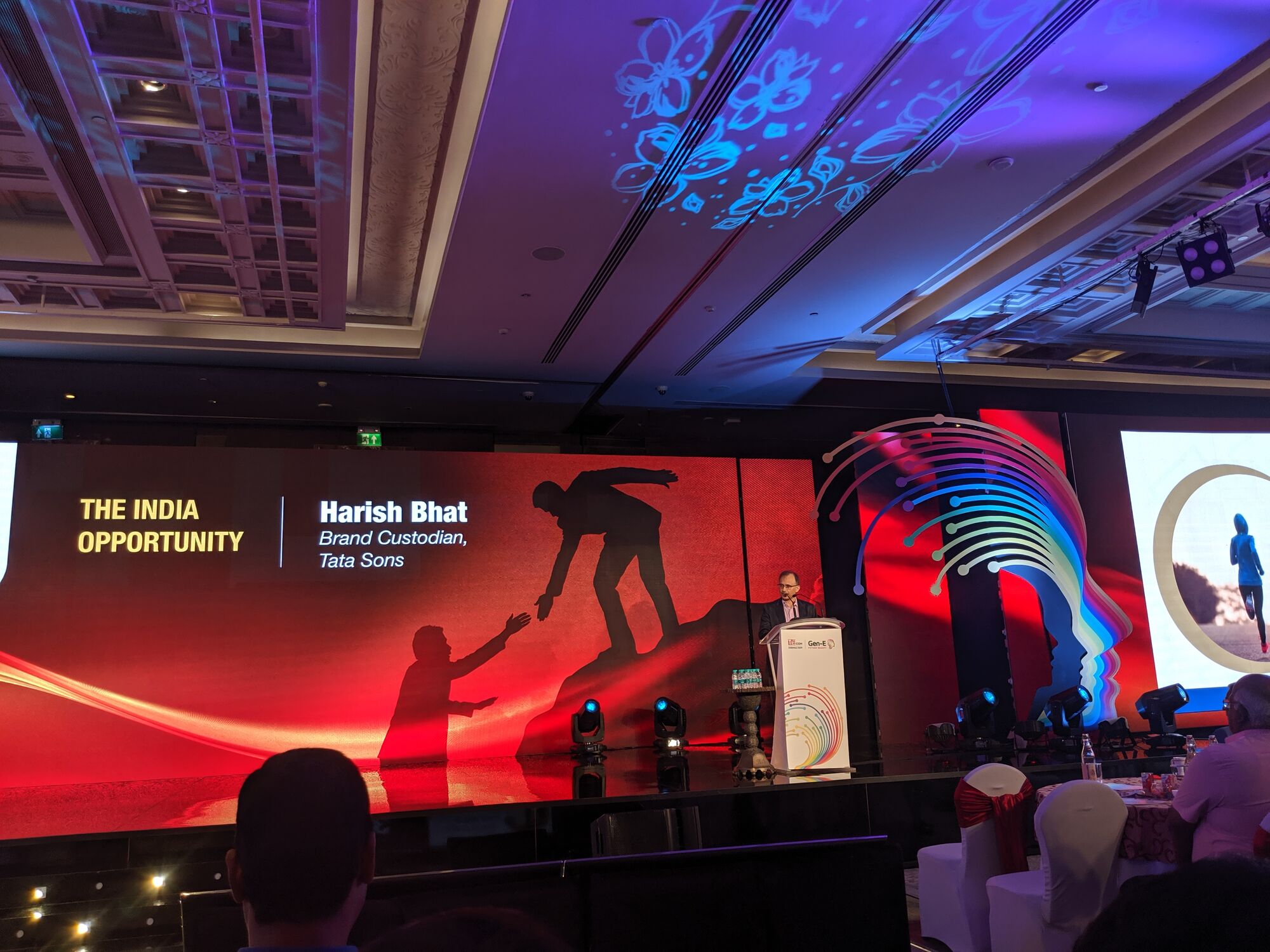
Mr R. Harish Bhat is the Brand Custodian at Tata Sons. He joined the Tata Group in 1987, as an officer in the Tata Administrative Service (TAS).
Mr Harish Bhat, Brand Custodian, Tata sons told us on why India is a growth engine and we shouldn’t be worried by short-term hiccups (read slow-downs). Six things that are going for India:
- Affluent India: High and upper-middle-income segment share in the total of households 219M in 2005, 293M in 2018, 386 in 2033; 8%, 24%, 51%, i.e. 17 (2005) to 70 (2018) to 200 Mn (2033) high and upper-middle-income households in India. Ten States in India are in breakthrough growth including Telangana, Tamil Nadu and others.
- Young India: 77% millennials and Gen Z. 90 million new households are going to be created. 10 million freshly skilled youngsters everywhere.
- Boomtown India: This was revealed to me only a few years ago. In addition to 9 metros, there are 31 boomtowns, 5000 urban towns, 50000 rural towns that are growing fast. They do have challenges, will want greater cultural affiliations, cost-effective. Against 60% urban access to the internet, in these towns, they are as low as 15%.
- Connected India: 1.1 billion internet users, 90% are mobile-first, 830 Mn smartphone users & 80% would like to navigate and transact in vernacular – just 6% of India, 41% of Rich, 2% of Poor speak English. Even in South India, the average who speak in English is less than 10.8%. 220 Mn eCommerce users by 2025.
- Health seeking India: On the face of it, it is not a good trend but offers a big opportunity. 60% of cardiovascular diseases happen in India. The top polluted cities are here. Only 11% of the population has some kind of health insurance. Organic market to grow 10 times in five years. 63% of deaths due to lifestyle diseases every year.
- Inclusive India: India ranked in the bottom ten of women employment. How to improve them? Farmer suicides. How to prevent them? How to have environmentally friendly growth. 3 million women in rural India are trained on how to use the internet through Google. It has created a huge impact. Croma has started an initiative to responsibly dispose of used electronics.
Entrepreneurship for all seasons
Mr CK Ranganathan, Founder of Cavin Kare, talks with Mr V R (Idhayam) Muthu of VVV & Sons Edible Oils.
- Mr Muthu says GST has been a boon, their tax payment has come down from crores per month to lakhs (of course input tax is being paid). He talks of their company was always keeping clean books because of the need to maintain the harmony between the brothers.
- He urges the government to reduce the harassment like I.T. raids to honest taxpayers to set a good example to general people.
- He has written a saying ‘தேடினால் தேடாதெல்லாம் கிடைக்கும்’, very true.
- 10% of their sales for them is in exports, thanks to Tamilians living abroad.
The future is closer than you think

“The future is closer than you think” panel hosted by J Krishnan
Unlike most panel discussions I have listened to, this panel was on time and focused on the given topic. “The future is closer than you think” panel hosted by Mr J Krishnan. He quotes Charlie Chaplin‘s “Modern Times” wherein the factory assembly line where he fixes nuts, he fights the past while handling future incoming in the pipeline forgetting the present.
Ms Shanthi Padmanabhan, VP of SalesForce.com talks of her 20 years of experience with Philips, Webb they had to launch two years before the other markets with their DVD players, as unlike in Europe, in India it had to play all kinds of discs. There is an assumption being a large corporate, there is a lot of money available, but it’s not so. In the case of Philips LED, the HuE (brand) idea was started eight years before the launch, they had to do a demonstrable product to get the internal funding.
How Philips struggling to launch a new category, invested in a founder company in Pondicherry and they moved fast, launched in for 4 years and gave 4 X return.
Mr Tarun Mahadevan, Cool Cream Milano (Writers Cafe) talks of empowering youngsters. They were initially selling only coffee/tea before they started incentive for selling other products like blueberry drinks. They have a strategy team different from the operations team. He talked about the need to invest in acquiring correct and timely data. Significant investment in value engineering.
Mr M V Subramanian, Future Focus Infotech talks of his early days when he was a stockbroker and just had got a licence to trade, suddenly NSE came in and changed the game and he had to start all over. He mentioned how the interview/hiring process has moved from paper, phone call, internet, bots and now AI. We have complete digital onboarding and blockchain-based verification.
He urges entrepreneurs to realise “The present problems you have will have a solution in the future that’s coming“. He quotes an example of Almond House in Hyderabad which is a century-old business has invested in IoT, branding and more.
People of Tomorrow

“People of Tomorrow” panel hosted by Ms Hemalatha Annamalai
“People of Tomorrow” panel hosted by Ms Hemalatha Annamalai, Ampere Vehicles. Disruption can’t be mandated by the government, it comes due to the pressure from the market and customer.
Ms Latha Nambisan, Savitur Business Consulting talks on the importance of culture. We need to balance the purpose and the culture that’s suited for that organisation. People wrongly see performance and culture / HR as two ends.
Mr Gowri Shankar Subramanian, Aspire Systems talks of the need to listen to everyone in the company and encouraging this. The perception that Millenials don’t work hard if you give them the ambience they are ambitious and hard-working. Certainly, the environment needed to nurture them is different with room to grow. The rules shouldn’t be enforced if the job role doesn’t require it. Attention all the time to customers, employees, and society. All the initiatives started should be tried to be sustained.
Romancing the Unexplored

“Romancing their unexplored” hosted by Mr R Ramaraj
“Romancing their unexplored” hosted by Mr R Ramaraj. These three young, energetic entrepreneurs have started their business, paving their own path, and, not following their parents’ line of businesses. Interesting to hear.
Towards the Hockey Stick
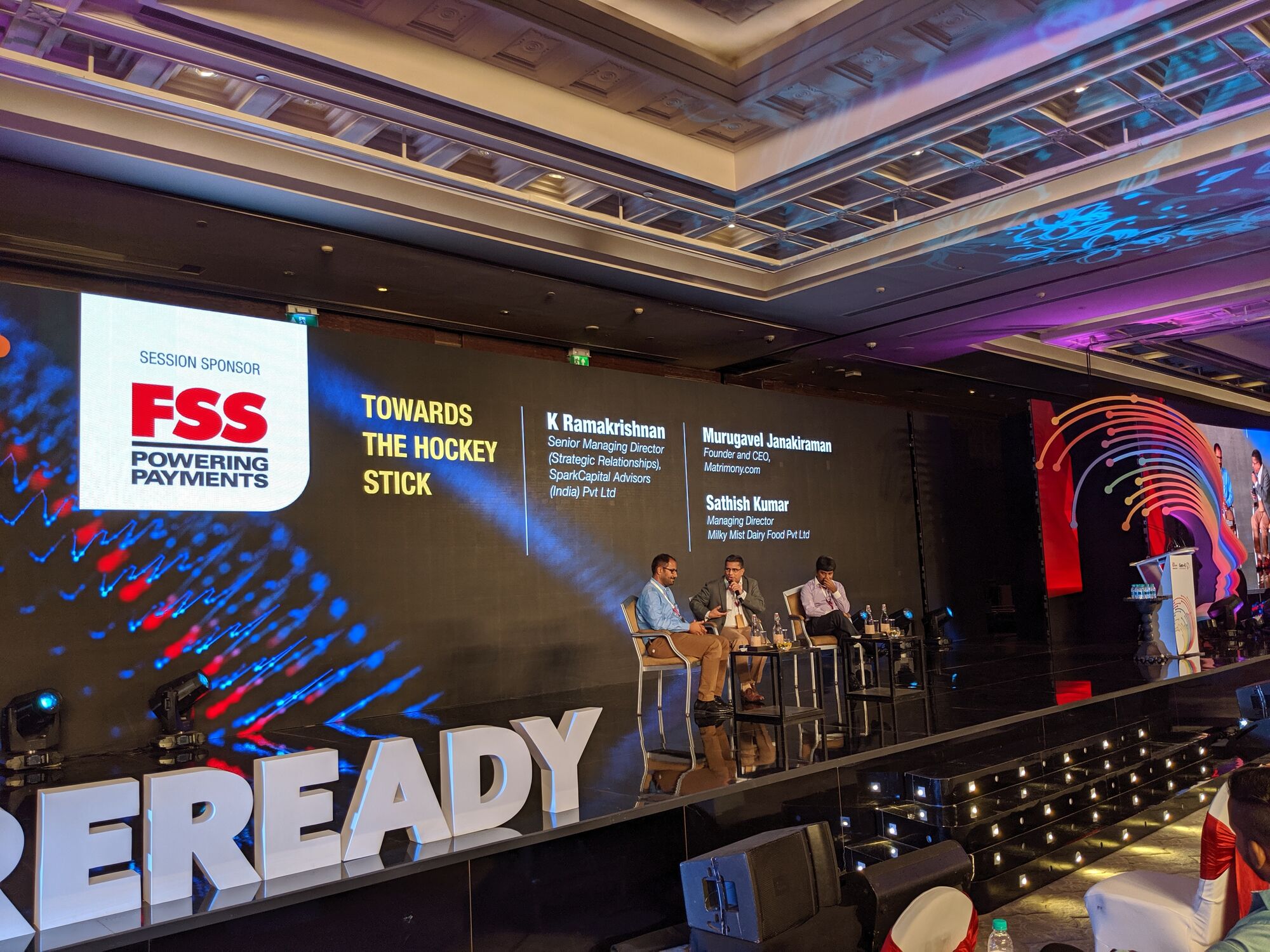
“Towards the hockey stick” hosted by Mr K Ramakrishnan
“Towards the hockey stick” hosted by Mr K Ramakrishnan of Sparks capital.
Mr Sathish Kumar, Milky Mist Dairy: They are self-funded, bootstrapped, including their recent Rs.500 crores fully automated (Industry 4) project in Erode. He stopped halfway during a funding raise when he realised he will be working for the PE firm. He recalled the support he got from his wife during ideation on critical moments.
Mr Murugavel Janakiraman, Matrimony: Though they lose their customers (as Matrimony is not a repeat business!), they still keep growing due to the large size of the market. 4 million active users, 1 million new registrations every quarter. Still, only 10% of marriages happen through online. He recalled the early times when the business was losing money every month (crores) but being raised in Gujarat, his wife was not happy. Continuous learning was key.
What’s now, what’s new, what’s next?

What’s now, what’s new, what’s next? hosted by Mr Chandu Nair
“What’s now, what’s new, what’s next?” hosted by Mr Chandu Nair,
Mr Suresh Sambandam, Kissflow:
- SaaS – is India’s trillion-dollar opportunity. Today $180 billion dollars is India’s IT services, growing at 8% YoY. Freshworks is doing a revenue of $100m but is valued at $1.5B.
- The ecosystem we should work on is one, where we have strengths.
- Chennai has over 15,000 people who are working on SaaS, across 700 SaaS companies, these together aggregated have a revenue of $1B.
- For the $ you put in SaaS business, and you start making revenue, the revenue stays with you for every year, as its a subscription.
- Invest in SEO and then SEM ( Search Engine Marketing).
Mr Gautam Saraongi, Go Fashion:
- India had a handful of malls a decade ago, in the last ten years there has been over 370 malls, totalling over 70,000 stores apart from the high street shops. India is a value-conscious market. India women wear 25 years ago was a saree market, later went to churidar, leggings to a fashion market. Anything disruptive is good in India, but pricing has to be sharp.
- We opened their first pop-up store in Express mall, Chennai, then in Lucknow, Mumbai, we made a lot of mistakes but cheaper and learned a lot.
- The emotion of buying between online and offline are different. Online is a price / discounted channel. There are 1.5 lakh sellers on Flipkart only for leggings. Apparel is a touch n feel market. Over 60% of sales online eCommerce in India is electronics.
- It is a myth that from Chennai you can’t build a brand; we build the entire brand marketing from Chennai.
[Disclaimer: This post is from my notes, it is not comprehensive nor meant to be accurate]


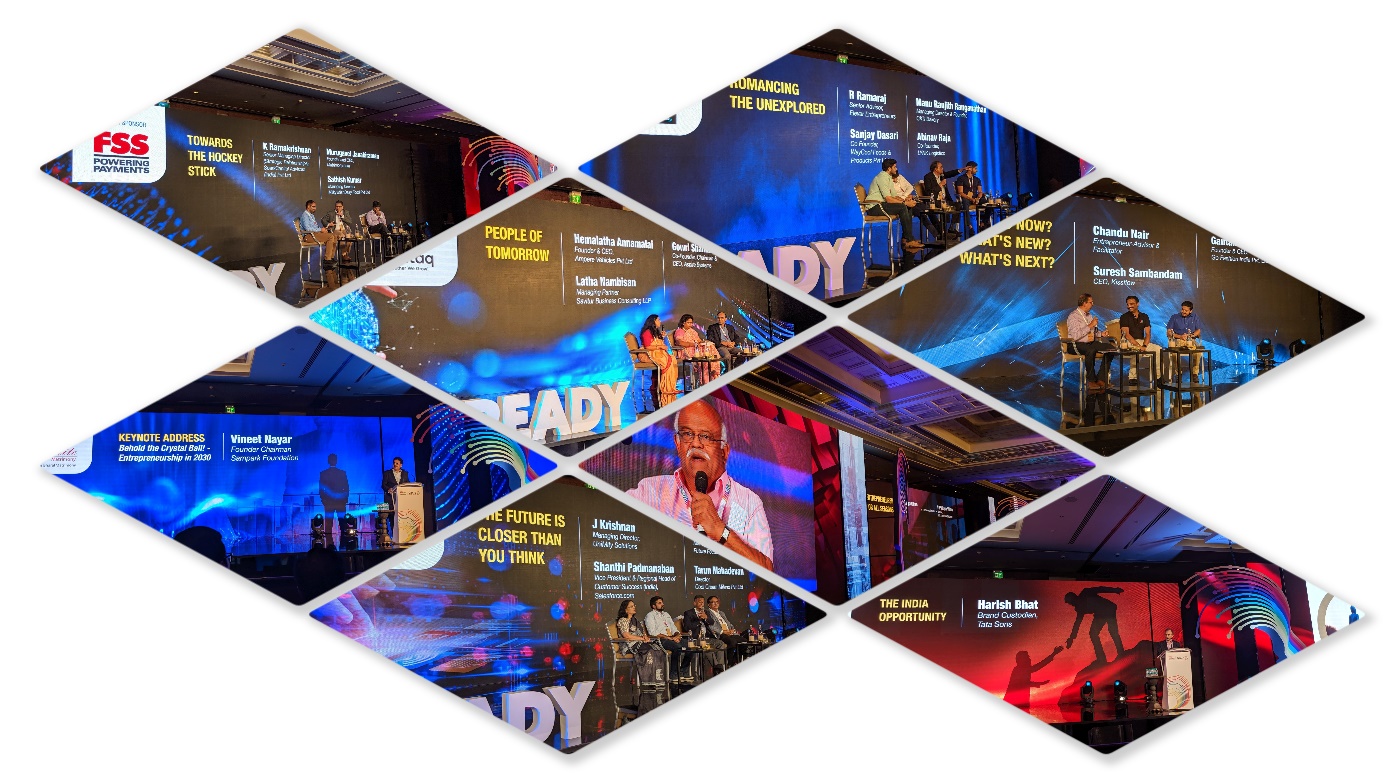
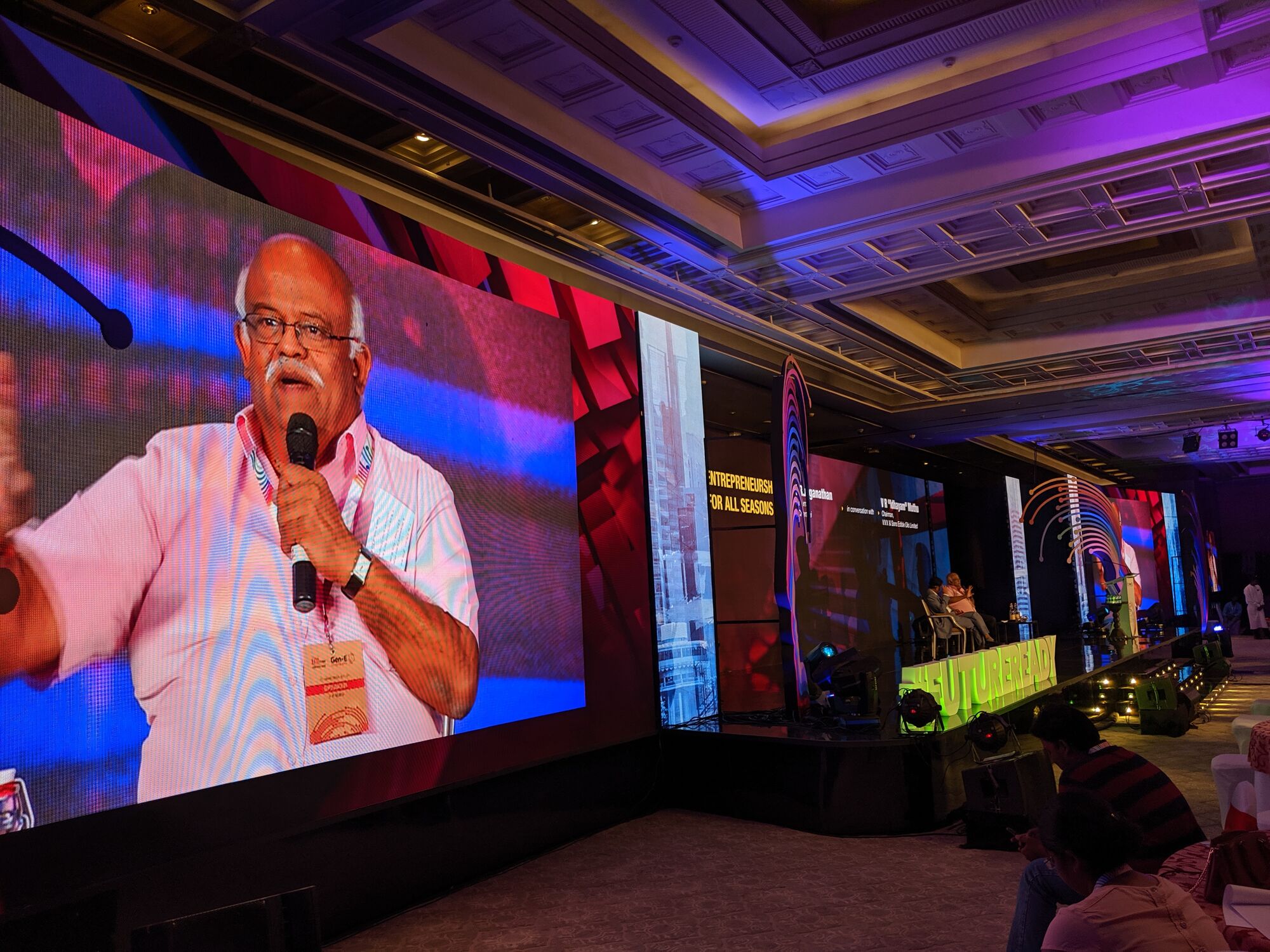
Venkat it is wonderful coverage